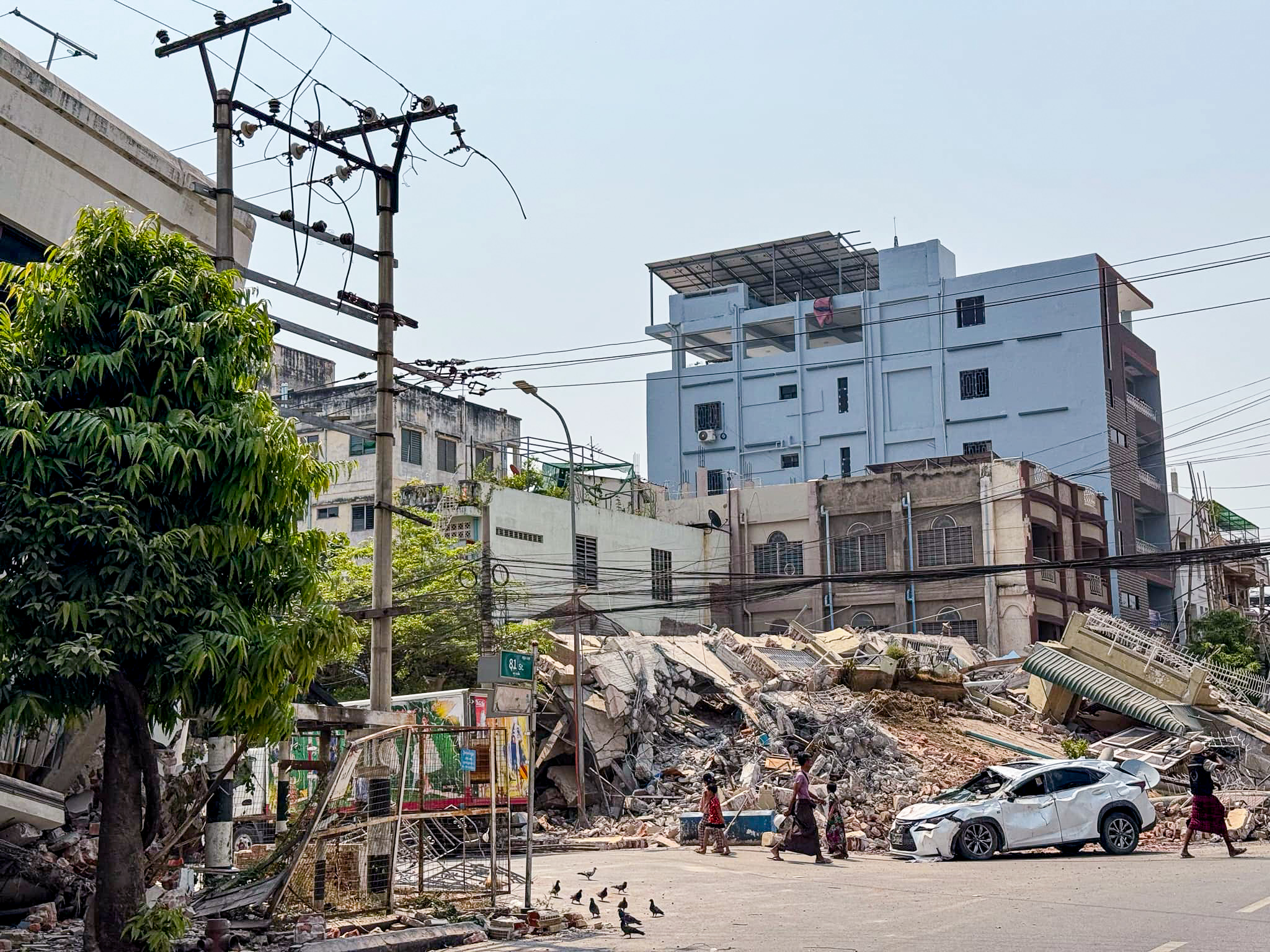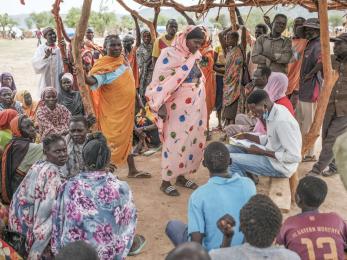We asked refugees: What did you bring with you?

Editor's note: This article was originally published in 2015. The conflict in Syria has now raged for eight years. For the most recent information on the situation, visit our Syria quick facts page.
After eight years of war, millions of Syrians are still living far from home with no idea when they'll be able to return. Nearly one in four refugees worldwide is from Syria. Refugee life is their new reality, filled with heartbreak and challenges.
MORE PHOTOS: What do refugees need after leaving everything behind? ▸
While some fled to refugee camps, most live in host communities in Syria's neighboring countries. Many had to run from their houses with only the few personal items they could carry.
These items have become bittersweet symbols of home and hope — they connect them to the life they've loved and ache to regain one day.
To shed light on the personal experiences in the midst of this crisis, we visited Syrians participating in our programmes in Jordan and asked: What is the most important thing you brought with you?
Sajida — Zaatari Camp

Sajida, 14, and her family left their home in Daraa, Syria for the safety of Jordan in 2013. Before she left, she and her close friends exchanged necklaces.
“At the beginning of the war we didn’t know what was going to happen, we thought we might get separated so we gave each other gifts to remember one another by.” All of the other girls have remained in Syria. This necklace is from her best friend, Batool.
Sajida participates in arts and crafts at school in this Mercy Corps extracurricular classroom.
Muhanad — Zaatari Camp

Muhanad, 7, and his family have lived in Jordan since 2013. He's holding a birthday gift from his grandfather. The robot toy reminds him of his grandfather, "who is now in heaven," he tells me.
Muhanad is at his school, in one of the Mercy Corps activity rooms where he participates in drawing, painting, and games.
Muhammad — Zaatari Camp

Muhammad, 25, is from Daraa, Syria where he used to teach kindergarten. His hobby was giving his friends haircuts and shaves. The barber equipment he brought with him is a reminder of the dear people he used to spend time with while he cut their hair.
He’s stopped his hobby now — the last person he gave a haircut to, his best friend, was killed in the conflict. Since moving to the camp, Muhammad has married and had a baby. He now teaches students with disabilities in this Mercy Corps resource room.
Alaa — Zaatari Camp

Alaa, 18, and his family have been living in Zaatari since 2012, when the camp first opened, after fleeing Daraa. Alaa is holding prayer beads, a gift from his best friend before he left Syria.
Alaa is sitting in a Mercy Corps resource room where he receives one-on-one instruction as a participant in Mercy Corps' inclusive education project for students with disabilities. He has cerebral palsy and was not enrolled in school until Mercy Corps met him and showed him the benefits of attending.
Muhammad — Zaatari Camp

Muhammad, 21, is originally from Damascus, Syria. This painting reminds him of a friend, Salee, who lived in Muhammad’s neighbourhood in Syria and was killed in the conflict.
The left side represents her childhood in Syria before the war. The right side represents her childhood after the conflict. “This memory is important to me because it shows this sweet girl's happy childhood before the war and her childhood turning to stone after the war began.” Muhammad now teaches art to students in Mercy Corps’ activity programmes.
Muhammad — Zaatari Camp

Muhammad, 18, says that the numbers on his phone are the most important thing that he brought with him from Syria. The numbers allow him to communicate with his friends and family who stayed behind.
Muhammad has severe scoliosis, but is able to attend classes thanks to Mercy Corps’ inclusive education programme. He learns and participates in activities in this Mercy Corps classroom in the camp.
Basma — Azraq Camp

Basma, 15, and her family left Homs, Syria for Jordan in 2014. She proudly wears the watch her aunt gave her for her birthday — and as a parting gift as she fled to Lebanon.
Basma is in a Mercy Corps' adolescent-friendly space, where she participates in computer class, knitting, and crafts.
Haneen — Azraq Camp

Haneen, 20, and her husband arrived in Azraq in 2014 from Syria. She brought with her wedding gifts from her husband and a teddy bear from her father, who stayed in Syria.
Haneen is seen here at one of Mercy Corp's adolescent spaces, where she volunteers. She also spends time volunteering in the community to build awareness about Mercy Corps' activities and programmes in the camp.
Um Shadee and Abu Shadee — Azraq Camp

Um Shadee, 50, and her family fled Homs, Syria in 2014. They left so quickly that they brought nothing with them but the clothes on their backs. She tells me that the most important thing she brought with her is her husband, Abu Shadee. Two of their seven children are with them now, but the other five are married and remained in Syria.
Um Shadee and Abu Shadee are in the caravan where she teaches knitting to girls in one of Mercy Corps' adolescent-friendly spaces.
Faysal — Azraq Camp

Faysal, 30, and his family arrived at Azraq camp in 2014 from Damascus. He's wearing his Shmagh (head scarf), which he holds onto dearly. His good friend who died in the Syrian conflict gave it to him.
Faysal teaches boys football in one of Mercy Corps' adolescent-friendly spaces in the camp.
Reema — Azraq Camp

Reema and her family fled Damascus for Jordan in 2014. Reema sold all of her gold before the journey, except the gold heart necklace her mother gave her when she gave birth to her first son, Adnan.
Reema teaches knitting and sewing to girls in Mercy Corps' adolescent-friendly spaces.
Sumaya — Mafraq, Jordan

Sumaya, 19, and her family have been living in Jordan as refugees since 2012. “This card was part of my birthday present from my best friend. I only brought the card with me. Two days after my birthday my friend was killed. Whenever I’m sad or feeling angry I open the musical card and I feel like there is still hope.”
Sumaya is working with a Mercy Corps’ partner organisation to learn new skills that will help her move forward, despite the trauma she's experienced. She just finished the beauty programme and hopes to continue her beauty education and go on to earn a university degree.
Halaa — Mafraq, Jordan

Halaa, 14, and her family have been refugees since 2014. “These were my father’s notebooks for his carpentry business. He was illiterate; he trusted only me and my older sister to keep track of the business records. He wouldn’t let anyone else touch the notebooks, not even my brother. The notebooks are the only material items we have as memories of my father.”
Halaa is learning new skills as part of a Mercy Corps’ partner programme. She just finishing the tailoring programme and hopes to learn something new next session. Marianna, Halaa’s child protection representative, says: “Every day Halaa and her mother open the two notebooks, read the notes, and cry. When Halaa came she was really devastated by everything that has happened, and she has started to get better here in the center.”
Manar — Mafraq, Jordan

Manar and her family arrived in Jordan in 2013, from Homs, Syria. Manar, like Halaa, just finished the tailoring programme through a Mercy Corps’ partner organisation. “I was enrolled in school when I first arrived here. They sent my brother back to Syria, so I had to leave school to help at home. I miss school. Next year I hope to return.”
She has two brothers in Syria. One of them didn’t have papers to allow him to cross the border into Jordan and the other was caught working, which is illegal for refugees. “When they were bombing in Homs, we were so afraid. These photos are from when I was little. We brought a lot of things with us, but they didn’t let us bring our things across the border.” Manar managed to bring her photos across, which remind her of her family.
Abd Al Kareem — Mafraq, Jordan

Abd Al Kareem and his family arrived in Jordan in 2013. He just finished a sports training programme and hopes to learn more skills through the Mercy Corps’ partner programme.
He’s wearing the clothes he was wearing when he crossed the border from Syria to Jordan. He fled the war with only the clothes on his back. “The clothes remind me of Syria, that’s why they are important to me.”
Nisreen — Mafraq, Jordan

Nisreen, 30, her husband and four kids, ages 6-11, fled to Jordan in 2013 after her husband was injured in the war. Nisreen is a volunteer arts and crafts instructor at Mercy Corps’ partner centre.
The programs there help give Syrian and Jordanian youth alternative education, skills, and psychosocial support to address the profound stress they’ve endured. Nisreen says that the most important thing she brought with her from Syria is her smile and her positive attitude.
“When I left Syria, I thought that I would never smile again or have this positive attitude again because all of the rest of my family went to Lebanon. But when I met the Jordanians, especially my neighbours, and came to the centre to meet all of the other volunteers and instructors, I felt as if I were at home and everyone was my family, and then I found my smile and spirit.”
Judge Khalid — Mafraq, Jordan

Judge Khalid, 48, and his family arrived in Jordan in 2012 from Homs, Syria. Judge Khalid is a community leader in Mercy Corps’ conflict resolution programme for Syrian refugees and Jordanians. The program helps build a peaceful community between the two groups.
Khalid and his family fled bombings so quickly, they had no time to bring any material things with them. The most important thing Khalid brought with him is his family.
Salsabeel — Sahal Huron, Jordan

Salsabeel, 30, her three children, and her husband fled Syria after their home was destroyed. Salsabeel is a community leader in Mercy Corps’ conflict resolution programme.
After their home was destroyed, they had nothing left to bring with them. Salsabeel’s children — her two girls and her son Hamza, 3, are everything she has now.
She and her daughters Bayal and Nada are standing under a garden cover that the leaders built to help bring the two groups together. The leaders also built a playground in the garden where their children can now play.
Our work to help Syrian refugees is made possible thanks to support from UNICEF, UK Aid, and Foreign Affairs, Trade and Development Canada, as well as generous donors like you.


